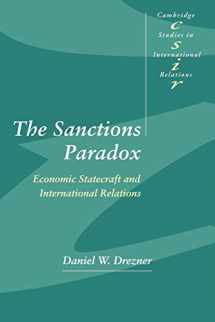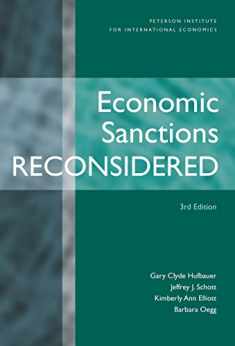
The Sanctions Paradox: Economic Statecraft and International Relations (Cambridge Studies in International Relations, Series Number 65)
ISBN-13:
9780521644150
ISBN-10:
0521644151
Author:
Daniel W. Drezner
Publication date:
1999
Publisher:
Cambridge University Press
Format:
Paperback
364 pages
FREE US shipping
Book details
ISBN-13:
9780521644150
ISBN-10:
0521644151
Author:
Daniel W. Drezner
Publication date:
1999
Publisher:
Cambridge University Press
Format:
Paperback
364 pages
Summary
The Sanctions Paradox: Economic Statecraft and International Relations (Cambridge Studies in International Relations, Series Number 65) (ISBN-13: 9780521644150 and ISBN-10: 0521644151), written by authors
Daniel W. Drezner, was published by Cambridge University Press in 1999.
With an overall rating of 3.9 stars, it's a notable title among other
Economic Policy & Development
(Economics, International & World Politics, Politics & Government, Political Science) books. You can easily purchase or rent The Sanctions Paradox: Economic Statecraft and International Relations (Cambridge Studies in International Relations, Series Number 65) (Paperback) from BooksRun,
along with many other new and used
Economic Policy & Development
books
and textbooks.
And, if you're looking to sell your copy, our current buyback offer is $0.82.
Description
The conventional wisdom is that economic sanctions do not work in international affairs. If so, why do countries wield them so often? Daniel Drezner argues that, paradoxically, countries will be most eager to use sanctions under conditions where they will produce the feeblest results. States anticipate frequent conflicts with adversaries, and are therefore more willing to use sanctions. However, precisely because they anticipate more conflicts, sanctioned states will not concede, despite the cost. Economic sanctions are thus far less likely to be effective between adversaries than between allies.


We would LOVE it if you could help us and other readers by reviewing the book
Book review

Congratulations! We have received your book review.
{user}
{createdAt}
by {truncated_author}



